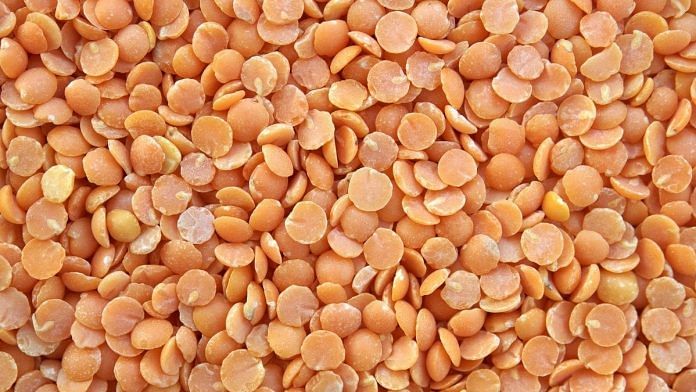New Delhi: Farmers and traders are disappointed with the Narendra Modi government over its decision to cut the import duty on lentils (masoor dal) to less than half even as the international prices have spiked by over 12 per cent.
The agricultural stakeholders criticised the move over fears that the lowering of duty on masoor, which is a rabi crop with the harvest season currently ongoing, will hurt farmers amid the Covid-19 crisis as it will bring down the market price of the pulse from its minimum support price (MSP) of Rs 4,800 per quintal.
The comments came after the Ministry of Finance notified the slash in import duty on masoor dal from 30 to 10 per cent. This reduction is applicable from 2 June to 31 August after which the masoor import tariff will be raised to the previous rate of 30 per cent.
The Reserve Bank of India had called for a pulses import policy review to control inflation, as their prices had risen in April amid the nationwide lockdown.
As the government notified the duty revision, global prices rose. The Canadian masoor price increased from $600 per metric tonnes to $675/MT on 4 June while the Australian masoor price rose from $620/MT to $680/MT, shows commodities market data.
The duty cut has sparked suspicion among farmers and traders who allege that this has been done to aid influential trading groups whose consignment may arrive soon. Moreover, they highlighted that masoor isn’t even the dominant pulse in India, with channa and tur constituting 75 per cent of the consumption.
Also read: Govt approves big agricultural reforms that’ll help farmers trade freely, get better price
‘Decision against Atmanirbhar Bharat’
Farmers’ forum Bharat Krishak Samaj chairperson Ajay Vir Jakhar expressed fears that the move will hurt the remunerative prices pulses farmers are getting in the current harvest season.
“The decision to lower the import duty on pulses goes against the scheme of PM Modi to make India atmanirbhar (self-reliant). It looks like an action to sabotage it,” said Jakhar.
“The farmers will keep a lookout on the consignments arriving at Indian ports in the next few days to see who will benefit from the revision in import duty and will report the same to the PMO (Prime Minister’s Office),” added Jakhar.
The rise in international prices and a cut in import tariff will only help the companies that have purchased the pulses before this spike at prices due to import cuts and their shipment will arrive soon, alleged traders who didn’t wish to be named.
They said even if import duty reduction had been allowed from 1 September, it would have made sense as a large part of domestic masoor crop would have been consumed and the next harvest would be more than four to six months away.
Also read: Only one state, 2 UTs have taken foodgrains meant for migrants under PM Atmanirbhar scheme
‘No explanation’
Mohit Upadhyay, an HmvAgro pulse trader in West Bengal said, “The total Indian consumption of lentils is around 1.8 million tonnes and our production is around 1.1 million tonnes with an import till March of around 0.8 million tonnes. Even if a shift of people’s consumption pattern during a pandemic increases by 10 per cent, then also that would be around 2 million tonnes.”
He said this demand could have been fulfilled by Indian farmers during the current harvest season if they were given better prices. “But the reason behind such sudden decrease of duty on lentils is unknown and there has been no explanation whatsoever from the government,” he said.
As the foreign trade involves many risks and depends on many factors, such a move could disrupt the trade, especially smaller traders as well as importers, Upadhyay added.
Masoor with a harvest of 14 lakh metric tonnes (LMT) constituted less than 7 per cent of India’s total annual pulses output of 230 LMT in 2018-19, according to government data. Chana/gram and tur/arhar accounted for around 60 per cent with 100 LMT and 30 LMT, respectively.
Fall in prices
In May, RBI Governor Shaktikanta Das had advocated a review of the pulses import policy in a view of inflation of prices in April after a comfortable period in February-March. However, pulses have witnessed a considerable fall in prices from April across the market.
According to the Consumer Affairs Ministry month-end wholesale price report, tur/arhar prices have dropped from Rs 8,750/quintal in April to Rs 8,400/quintal in May. Similarly, the price of moong fell from Rs 9,700/quintal to Rs 9,400/quintal in the same period.
The retail prices of pulses have also fallen considerably. Channa/gram dal prices fell from Rs 86/kg in April to Rs76/kg in May. Masoor itself witnessed a dip in prices in the corresponding period from Rs 81/kg to Rs 79/kg.
Also read: All about Agridex, India’s first agricultural index to trade in commodities market




Good news
Such news really go against the “atmanirbhar Bharat concept. In fact most the steps taken Modi govt is good only for traders and businessmen. The working class groupinclding farmers, laborers, employees hardly get anything. I remember one example: during Dokalam crisis, there were lots of messaging, strikes to stop buying Chinese items. So many people avoided it seems. In a month or two many messages came requesting to buy Chinese items. Why? Because the Indian traders who already paid to get the Chinese items were not able to sell and were going into losses. If India can produce same items for a lower price than the Chinese, then people will buy Indian items. Why India cannot? Because the so-called owners use unorganized labour, exploit them to the core, don’t spend money in training, keep the price high to generate more profit; all these finally result in killing the labourers making India unproductive. As long as Modi listens to traders, exploiting businessmen India can never become “atmanirbharsila”.